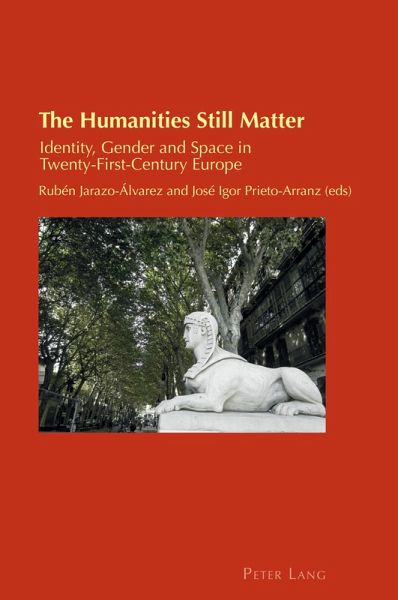
The Humanities Still Matter (eBook, PDF)
Identity, Gender and Space in Twenty-First-Century Europe
Versandkostenfrei!
Sofort per Download lieferbar
Statt: 55,05 €**
42,95 €
inkl. MwSt.
**Preis der gedruckten Ausgabe (Broschiertes Buch)
Alle Infos zum eBook verschenkenWeitere Ausgaben:

PAYBACK Punkte
21 °P sammeln!
Why are the arts and humanities under attack? And how can they fight back?Historically these fields have suffered from a lack of prestige due to the utilitarian perspective of the «developed» world. While such utilitarian views have not been entirely fair on this branch of knowledge, the humanities themselves are partly to blame for this crisis, often not keeping pace with an increasingly changing society. It is therefore imperative that the humanities once and for all prove themselves relevant, leaving behind «departmentalized» approaches to academic knowledge and embracing the social mis...
Why are the arts and humanities under attack? And how can they fight back?
Historically these fields have suffered from a lack of prestige due to the utilitarian perspective of the «developed» world. While such utilitarian views have not been entirely fair on this branch of knowledge, the humanities themselves are partly to blame for this crisis, often not keeping pace with an increasingly changing society. It is therefore imperative that the humanities once and for all prove themselves relevant, leaving behind «departmentalized» approaches to academic knowledge and embracing the social mission that once epitomized humanistic study.
Guided by such principles, this book features fourteen interdisciplinary studies that explore exciting intersections between different areas of academic research. These studies centre around three broad topics, which function as this volume's structural axes: identity, gender, and space and mobility (whether voluntary, as in tourism, or imposed, as in the case of migrations and persecutions). Altogether, the volume demonstrates that the humanities, far from being artificially detached from society, can actually study the enormously complex context that is contemporary Europe and crucially point the way to a better, more equitable world.
Historically these fields have suffered from a lack of prestige due to the utilitarian perspective of the «developed» world. While such utilitarian views have not been entirely fair on this branch of knowledge, the humanities themselves are partly to blame for this crisis, often not keeping pace with an increasingly changing society. It is therefore imperative that the humanities once and for all prove themselves relevant, leaving behind «departmentalized» approaches to academic knowledge and embracing the social mission that once epitomized humanistic study.
Guided by such principles, this book features fourteen interdisciplinary studies that explore exciting intersections between different areas of academic research. These studies centre around three broad topics, which function as this volume's structural axes: identity, gender, and space and mobility (whether voluntary, as in tourism, or imposed, as in the case of migrations and persecutions). Altogether, the volume demonstrates that the humanities, far from being artificially detached from society, can actually study the enormously complex context that is contemporary Europe and crucially point the way to a better, more equitable world.
Dieser Download kann aus rechtlichen Gründen nur mit Rechnungsadresse in A, D ausgeliefert werden.













